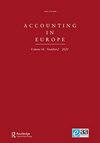Making Deferred Taxes Relevant
IF 4.6
Q1 BUSINESS, FINANCE
引用次数: 16
Abstract
Abstract We analyse the conceptual problems in current accounting for deferred taxes and provide solutions derived from the literature in order to make International Financial Reporting Standards (IFRS) deferred tax numbers value-relevant. In our view, the empirical results concerning the value relevance of deferred taxes should find their way into the accounting standard-setting process. We conclude that deferred taxes should only be recognised for temporary differences that will result in real future tax payments and/or tax receipts. Temporary differences for which the tax cash flow has already occurred have valuation implications for the underlying asset or liability and should, therefore, be accounted for based on the valuation adjustment approach. Furthermore, we conclude that partial allocation should replace comprehensive allocation in order to better align deferred taxes with expected future cash flows and thus increase their relevance and understandability. Finally, we conclude that deferred tax balances should be measured on a discounted basis to address time value.使递延税款相关
摘要:我们分析了递延所得税现行会计中的概念问题,并从文献中提供了解决方案,以使国际财务报告准则(IFRS)递延所得税数字与价值相关。在我们看来,关于递延所得税的价值相关性的实证结果应该在会计准则制定过程中找到自己的方式。我们的结论是,递延所得税只应确认将导致未来实际纳税和/或税收收入的临时差异。已发生税项现金流量的临时差异对标的资产或负债具有估值影响,因此应根据估值调整方法进行核算。此外,我们得出结论,部分分配应取代全面分配,以便更好地将递延税与预期未来现金流量相结合,从而提高其相关性和可理解性。最后,我们得出结论,递延所得税余额应在贴现的基础上衡量,以解决时间价值。
本文章由计算机程序翻译,如有差异,请以英文原文为准。
求助全文
约1分钟内获得全文
求助全文

 求助内容:
求助内容: 应助结果提醒方式:
应助结果提醒方式:


